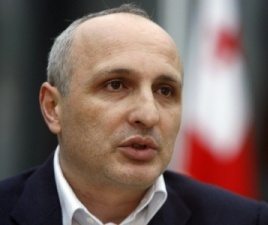
TBILISI, DFWatch – Recent sports events in Georgia are mainly connected to politics. After the Olympic judo champion Zurab Zviadauri joined the opposition Georgian Dream movement, two others within the same sport have joined him: Olympic bronze medalist Nestor Khergiani and former national team coach Shota Khabareli.
Georgian football has also had its share of controversy. First, the Georgian Football Federation’s vague rules which placed in doubt the winner of the championship Umaglesi Liga, and secondly, in the cup final which also gave cause to much doubt. In the first case two teams, FC Zestaponi and FC Metalurgi Rustavi, had the same amount of points and both teams claimed to have won the championship. In the end, the Football Federation announced FC Zestaponi winner. However, this was followed by a, to put it mildly, controversial referee decision in the cup final where FC Zestaponi met Dila, a team recently taken over by the ministry of internal affairs, and lost to them 1:4.
Sports in Georgia is receiving a lot of attention from the government these days. While the ministry of internal affairs has a newfound interest in being football manager, the ministry of defense has gone into basketball and manages its own team in that sport. This is likely to be expensive, and some are raising the question why the government is spending all this money. After the MIA took control of the football team Dila from Gori, the club has enjoyed an influx of famous Georgian players such as Mate Vatsadze, Gocha Khodjava and Zurab Arziani who played for Volga in Russian Premier League. Sandro Guruli who was playing in Karpati, Ukraine, also joined Dila. But the most famous player that joined the team was the defender Lasha Salukvadze who has been a member of Georgian national team since 2004. Until he signed a contract with Dila, he has been in playing for Russian championship winner Rubin Kazan, winning against such teams as FC Barcelona and FC Internazionale in the UEFA Champions League.
Another player that joined Dila is Mamuka Jugheli. He has held various positions in Russian teams including Volga and Anzhi (Maxachkala) and has been linked with almost every recent transfer of Georgian players to Russia. He has been a quite controversial figure even in Russia, as some famous sports journalists such as Vasily Utkin consider him to be the “expert” on promoting teams from the first division to the Russian premier league. Though there has never been presented evidence of his participation in match fixing or any other illegal action, some think that he had some links with shady operations.
Many see this as part of a trend, that the government participates and manages sports teams. Such management of course mainly happens through the use of administrative financial resources. The creation of a team like Dila today is quite expensive. The transfers discussed above require quite significant financial resources and even if all of the players were signed as free agents, one must assume that they are receiving higher salaries than they did in Russia, otherwise what is the point of playing in a much weaker Georgian championship.
All this may indicate two things: that the Georgian government is eager to take part in sports or that it has no other choice. It has definitely to be mentioned that private investors are not very eager to buy teams and rarely invest in sports. Even the most successful of team sports, rugby, is suffering from lack of investors but enjoys government support. Football is an extremely profitable business worldwide, but not in Georgia. Stadiums are almost empty during matches between even the best teams and the financial situation in teams is terrible if not disastrous. Only a few teams like Dinamo Tbilis, Zestaponi and Torpedo Kutaisi have private investors; all others are having financial troubles from time to time and often turn to the municipality for help.
As sports in Georgia becomes more and more financially unprofitable, the government for some reason seems to be interested in taking control over teams that are having difficulties, which raises suspicion about the motivation, as the government refused to put money into activities which it did not count as economically effective. So what stands behind the government’s actions – a wish to prevent sports from dying, or to gain supporters and influence?

